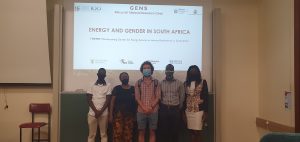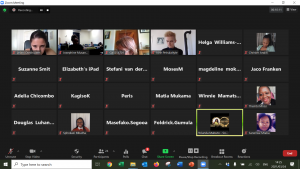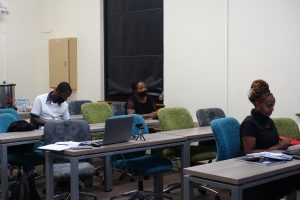 GENS held a first virtual stakeholder engagement workshop on Energy and Gender in South Africa on 24 March 2021. The workshop was themed Mainstreaming gender for energy security in informal settlements in South Africa and brought together 30 stakeholders, who were from the Department of Mineral Resources and Energy, Drake nstein Municipality, business, Groenheuwel community members, academics, and GENS Team from the three collaborating institutions, Stellenbosch University, Brunel University London and GENS Hosts Energy and Gender in South Africa Stakeholder Workshop of Nairobi (see Photo 1 showing screenshot). Six stakeholders were in one virtual room.
GENS held a first virtual stakeholder engagement workshop on Energy and Gender in South Africa on 24 March 2021. The workshop was themed Mainstreaming gender for energy security in informal settlements in South Africa and brought together 30 stakeholders, who were from the Department of Mineral Resources and Energy, Drake nstein Municipality, business, Groenheuwel community members, academics, and GENS Team from the three collaborating institutions, Stellenbosch University, Brunel University London and GENS Hosts Energy and Gender in South Africa Stakeholder Workshop of Nairobi (see Photo 1 showing screenshot). Six stakeholders were in one virtual room.
The objective of the workshop was to bring together the different stakeholders, including government, industry, academics, researchers and the Groenheuwel community, to discuss the question: How might we build research capacity, harness industry expertise, and frame policy to promote gender-informed innovation and commercialisation opportunities in alternative energy technology and services in the informal settlements in South Africa.
Prof Zwelizima Ndevu, the Director of the School of Public Leadership, welcomed the stakeholders and expressed his support for the workshop that links researchers, community members and government stakeholders to come up with “home-grown solutions.”
Notable invited speakers were: Ms. Elizabeth Marabwa, Chief Director, Programmes  and Project Management Office at the Department of Mineral Resources and Energy (DMRE). Ms. Marabwa presented the DMRE mandate in the energy sector, the policy framework that supports gender and energy, existing programmes at DMRE, and challenges that serve as a barrier to women’s participation. Although challenges to include women in the energy sector remain, the question is how to turn these into opportunities through collaborative efforts.
and Project Management Office at the Department of Mineral Resources and Energy (DMRE). Ms. Marabwa presented the DMRE mandate in the energy sector, the policy framework that supports gender and energy, existing programmes at DMRE, and challenges that serve as a barrier to women’s participation. Although challenges to include women in the energy sector remain, the question is how to turn these into opportunities through collaborative efforts.
Mr. Moses Mlangeni, the Manager: Economic Growth and Development at Drakenstein Municipality, Paarl, gave an overview of informal settlements in Drakenstein, the energy situation in Groenheuwel informal settlement, ongoing initiatives in Groenheuwel and opportunities for synergy with the GENS research. Some synergy opportunities include solutions to the supply of energy in buildings that serve the informal settlement population and reduce “Isinyoka.”
 Two community co-researchers, Mbulelo Ngalo and Brenda von Willingham expressed their experience being part of GENS research, and Ms. Gail Jacobs, currently serving as a community liaison at the Groenheuwel community, shared insights on how to encourage community stakeholders to become change agents in their community.
Two community co-researchers, Mbulelo Ngalo and Brenda von Willingham expressed their experience being part of GENS research, and Ms. Gail Jacobs, currently serving as a community liaison at the Groenheuwel community, shared insights on how to encourage community stakeholders to become change agents in their community.
The GENS team also had several presentations: Prof Musango presented how we are conceptualising gender mainstreaming in GENS. Dr. Ceschin discussed how GENS aims to support different stakeholders in codesigning, prototyping and testing gendered solutions in the GENS living lab. Further, Dr. Mwiti highlighted why we are co-facilitating multi-stakeholder engagements. Ms. Njoroge discussed how the existing literature frames gender in Africa policy landscapes, and lastly, Dr. Mukama described the GENS living lab’s set-up in Groenheuwel.
The expected outcome was to forge networks with different stakeholders and gain perspectives on building research capacity, harness industry expertise and frame policy to promote gendered energy solutions.
Some key highlights and messages that emerged during the workshop are the following:
- Gender is not equal to women. Gender mainstreaming is about engaging both men and women in innovating solutions. It is not only about the number of women involved but also the quality of experience of both women and men.
- How we frame gender determines the response we take at policy, industry, research, and community level.
- The vibrant and interactive workshop with the action plan that flowed from the multi-stakeholder workshop groups sets the next engagement scene.
The next GENS Stakeholder workshop in South Africa will take place on 13 October 2021.

